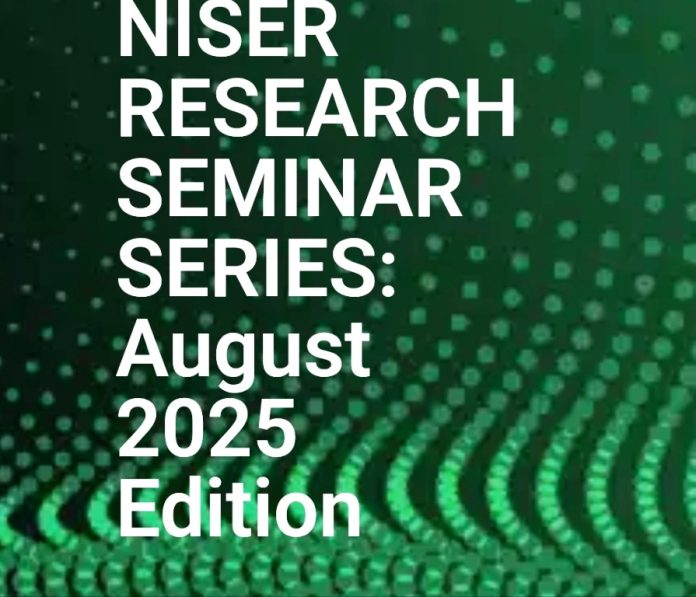FIC Report (Oyo State) – The Nigerian Institute for Social and Economic Research, NISER, has called on the subnationals of the country to explore the opportunities provided by the 2023 Electricity Act, to develop and promote a decentralised grid system for a stable and affordable electricity supply for businesses and residents of the country.
This call was made yesterday, Tuesday August 26th, 2025, by the Director-General of NISER, Professor Antonia Simbine, at the August edition of the Institute’s monthly Research presentation Seminar, held at its office in Ibadan, the Oyo State capital.
Speaking to kick-start the Seminar, the Director-General said that “the theme of the Seminar aligns with the the Renewed Hope Agenda of the present Government of President Bola Ahmed Tinubu, which places energy security, affordability, and sustainability at the heart of Nigeria’s economic transformation”.
Speaking further, Professor Sambine said “this conversation is not just about electricity tariffs. It is about livelihood, industrial competitiveness, and the pathway to national development”. The DG said “The Renewed Hope Agenda challenges us to design policies that make electricity, not only available, but also reliable, accessible and affordable, enabling households to thrive and businesses to compete globally”.
During the presentation, the lead researcher, Dr. Iyabode Olanrele, said that the study conducted by her group, has revealed that firms in Nigeria spend as much as 82 per cent of their monthly turnover on production costs, largely due to soaring electricity tariffs.
These findings were presented at the seminar with the theme ‘Balancing Electricity Tariffs and Consumers’ Wallets: Insights from Nigerian Households and Firms’ Ability to Pay”.
According to the presenter, the study further showed that “households now receive an average of 10 hours of electricity daily, far below the 20-hour benchmark” .
According to the lead researcher, Dr. Iyabo Olanrele, “the monthly grid electricity bills for households almost doubled from N17,647.49 to N34,942.04, a 98 per cent increase, while grid-related costs for firms rose by 92.2 per cent”.
She noted that 67.5 per cent of firms consider the new tariff unaffordable, with larger, high-input businesses most affected.
“The study found that firms spend 82% of their monthly turnover on production costs, mainly due to the electricity tariff. Although 87.5% reported moderate electricity supply improvement, it is still below the 20-hour requirement.
“Grid electricity expenditure rose by 92.2% due to the tariff hike, which 67.5% of firms found unaffordable, and large-scale and high input cost firms were less able to afford the increase, while older firms showed more resilience.
“The study shows coping strategies adopted by households and firms in the face of the challenges posed by the increase in tariffs.
“While households adopt switching to solar, inverters, and energy-efficient appliances, which not all can afford, many firms take to renewable energy use, energy-saving measures, and efficient technologies, with some firms remaining undecided,” she said.
The report found that “while 87.5 per cent of firms acknowledged moderate improvement in power supply, availability remains inadequate”.
It also highlighted coping strategies such as households adopting solar, inverters, and energy-saving appliances, while firms turn to renewable energy and efficiency technologies to cushion the impact.
Rounding off the seminar, the chairman of the occasion, Dr. Hassan Mahmud, the President of the Nigeria Association of Energy Economics, reviewed that “The meeting, after robust discussions by energy experts and economists, recommended that NERC should enforce service reliability mandate by setting minimum threshold for DISCO infrastructural investment before future hikes; and the federal government should raise household income by implementing the 2024 new minimum wage to create some respites.”
It would recall that one of the first actions of President Bola Ahmed Tinubu in office was giving assent to the 2023 Electricity Bill 2023 to become an Act. The Seminar is timely and also in sync with the Sensitization Campaign of the Federal Ministry of Information and National Orientation under the leadership of the Honorable Minister, Alhaji Muhammed Idris, to highlight the Mid-Term performance reports of President Bola Ahmed Tinubu.
The seminar had in attendance experts such as Dr Ekundayo Peter Mesagan of Pan-Atlantic University, Lagos, among others.
Signed
Mariam Abimbola,
Senior Account Officer (SAO) and Temi Osinuga (Miss Osinuga, a graduate of MassCom, is a Corp member serving at FIC, Ibadan).
Edited by Moses Oyelade, AD(I&PR), FIC Ibadan.






